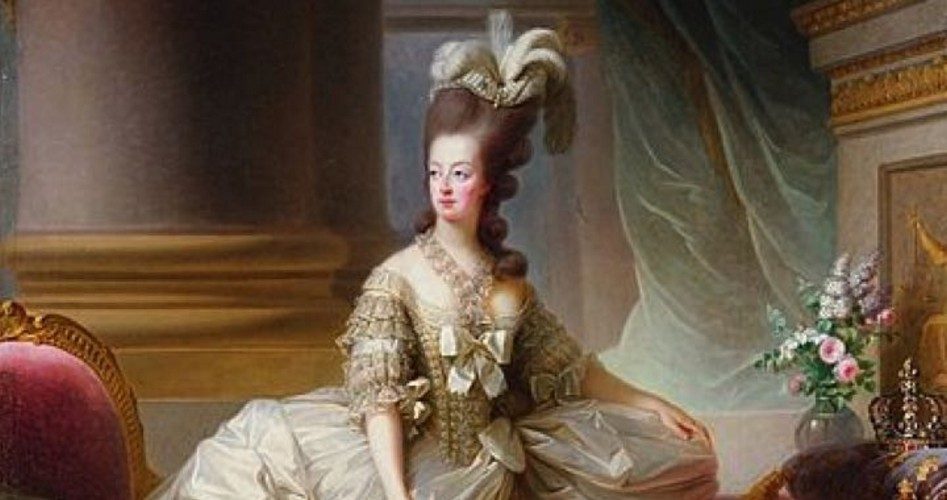
July 14 marks another anniversary of Bastille Day, the day the Paris mob rioted and stormed the Bastille, a prison fortress in the city. The popular image of the incident is that of the French Revolution itself, which is that the liberty-loving French folk in Paris spontaneously rose up against a tyrannical king and his arrogant wife, and heroically stormed the symbol of the Old Regime — liberating hundreds of political prisoners. This led to an abolition of the monarchy and the establishment of a government dedicated to liberty for all the people of France.
Nothing could be further from the truth.
Almost everyone has heard that Queen Marie Antoinette said, “Let them eat cake,” in haughty response to the plea of the poor starving masses of France: “We have no bread.”
That is also untrue.
And it is widely believed that Antoinette caused or at least was the principal cause — of the entire French Revolution.
That is ridiculous.
Whereas Louis XVI and his wife, Marie, are usually pictured in the history books and in the popular culture as tyrants of the worst sort, the truth is quite different. The real Marie Antoinette was a charitable woman, who lodged and fed 12 poor families, at her own expense, at Trianon. She founded the Society of Ladies of Maternal Charity. She even once stopped her carriage for over an hour to aid an injured person, waiting until a surgeon was located.
Historian Antonia Fraser disputed the cruel libel in her book Marie Antoinette, the Journey. “As a handy journalistic cliché, [“Let them eat cake”] it may never die,” Fraser wrote, adding “such ignorant behavior would have been quite out of character. The unfashionably philanthropic Marie Antoinette would have been far more likely to bestow her own cake impulsively upon the starving people before her.”
If the Revolution was not caused by Marie Antoinette, then just who did cause it?
The French Revolution was actually the fruit of decades of radical agitation stirred up by anti-Christian, power-seeking secret societies that drank freely from the poison well of the Enlightenment, and it has served as the template for every radical leftist revolution since that time.
The seeds of the French Revolution were sown in the cafes, coffee houses, and secret societies that emerged in the Enlightenment. This is not to say that the entire Enlightenment was evil, but many of the personalities and ideas emerging from it were certainly radical. For example, among the most important events of the Enlightenment was the publication of a 35-volume Encylopedia, compiled under the editorship of the intensely anti-Christian Denis Diderot. The first edition even featured a winged Lucifer on its title page. (One might note that Saul Alinsky dedicated his 1971 book Rules for Radicals to Lucifer, also known as the Devil or Satan.)
With the continuing spread of these ideas — discussed openly in cafes, coffee houses, reading rooms, salons, and the like across Europe — some of these radicals began meeting in secret societies to discuss revolution.
One of those secret societies, the Bavarian Illuminati, was formed by Adam Weishaupt on May 1, 1776 (note that today communists around the world revere May 1). Weishaupt desired a society free from “the clouds of superstition and of prejudice.”
In his book To the Victors Go the Myths and the Monuments, John Birch Society CEO Art Thompson lists the major goals of the Illuminati: 1) the destruction of Christianity; 2) the destruction of nations as such in favor of universal internationalism; 3) the discouragement of patriotism and the substitution of the cry for universal brotherhood; 4) the abolition of family ties and marriage by means of systematic corruption; and 5) the suppression of the rights of inheritance and property.
The ideas of the Illuminati permeated the radical clubs of pre-revolutionary France. After the ruler of Bavaria outlawed the organization, the secret society migrated to Paris, which was already awash in Enlightenment radicalism and multiple radical clubs (such as the infamous Jacobins) that shared many of the ideas promoted by the Illuminati.
Much of the propaganda to destroy the Old Regime centered on Marie Antoinette, who was falsely portrayed as a woman of very low morals. For years, she was made the target of scurrilous pamphlets that made the rounds of revolutionists because it was understood that Marie, an Austrian princess, was an easy target for these brutal libels.
Others also conspired to overthrow the Bourbon Dynasty (a noble lineage that held lands and titles in several European countries), including the Duke of Orleans — a relative of the king — and the Prussian government, which wanted to destroy the Austrian-French alliance that had been cemented by the marriage of Louis and Marie. Both contributed the outbreak of the French Revolution in 1789.
But, it is clear that the French Revolution was principally the handiwork of radicals such as the Jacobins and the Illuminati of France who hated Christianity, the right of property, the family, and patriotism.
Marie Antoinette was the victim of the French Revolution, not the cause.
Steve Byas is the author of History’s Greatest Libels, which defends many historical figures from what he considers unfair treatment. He has one chapter on Marie Antoinette.



